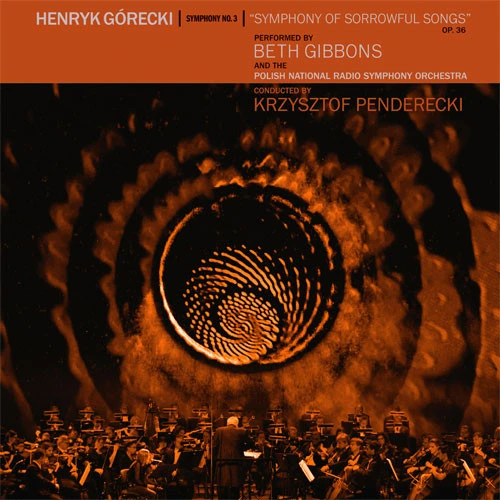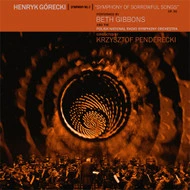Live 2014 Performance On 180g Vinyl LP!
Domino is extremely proud to present Henryk Górecki: Symphony No. 3 (Symphony of Sorrowful Songs) performed by Beth Gibbons and the Polish National Radio Symphony Orchestra, conducted by Krzysztof Penderecki. The performance took place at The National Opera Grand Theater in Warsaw on November 29, 2014, and was part of an evening of programming that also featured Jonny Greenwood's (Radiohead) 48 Responses To Polymorphia and the world premiere of Bryce Dessner's (The National) Réponse Lutoslawski.
Following an invitation to collaborate at the concert, Beth Gibbons undertook an intense preparation process, including tackling the challenge of learning the original text (and the emotional weight it carries) without speaking the mother language. Typical to Beth though - the elusive yet iconic front-woman of one of the most important British bands (Portishead) of the last two decades - the challenge was met and exceeded. Her performance alongside the maestro Krzysztof Penderecki has been hailed as triumphant, as you can see and hear on this release.
"It began in 2013 in Kraków.
Portishead, the band Beth has fronted for nearly 25 years, was playing at the Sacrum Profanum festival in the reclaimed steelworks in Nowa Huta: a giant, forbidding industrial complex on the outskirts of one of Europes most beautiful and contradictory cities.
"Between soundcheck and gig, Filip Berkowicz, the promoter, casually suggested that Beth could sing Henryk Góreckis third symphony, the Symphony Of Sorrowful Songs (Symfonia piesni zalosnych). The seed was sown.
"Beth struggles to stay still, which steers her toward the unexpected. When it comes to promoting records, she has withdrawn from interviews, where she feels awkward. When making an album away from Portishead, she teamed up with Paul Webb, late of Talk Talk, and turned out a series of beguiling songs (Out Of Season). When the world expected a new Portishead album, Beth scored two French arthouse films (Diane Bertrands LAnnulaire and Baby Blues) instead.
"Beth neither speaks Polish nor reads music. But in preparation for the performance, she worked from an especially prepared vocal score bearing the original text, a phonetic interpretation, and crucially - a translation.
"It was central to the performance that Beth could find her way. She tried and re-tried different interpretations of the piece, not wanting just another rendition.
"The other challenge was the music itself. Beths voice is, in classical terms, a contralto; Górecki wrote for a soprano, one register higher. While she had ventured into the soprano range before the chorus of All Mine, from Portisheads second album, for instance she hadnt spent a sustained stretch of time there in performance. So she had vocal coaching from Caroline Jaya-Ratnam in England, then Anna Marchwinska from Poland, with whom she also refined the pronunciation.
"But Beths guiding principle, into which she packed all the technicalities of performance and language and character, was to engage emotionally with the piece.
""Is technique more important or is the effect on the heart more important?"
"Whether singing one of her own lyrics Who am I? What? And why? or one of the symphonys Kajze mi sie podziol mòj synocek mily? (Where has he gone, my dearest son?) she is aiming at a direct emotional injection from performer to audience. In the voices of the symphonys text, as in life, she is a mother and daughter.
"Rehearsals took place in the NOSPR in Katowice, under the direction of Krzysztof Penderecki. Beth brought on board another long-term collaborator, artist John Minton, to prepare a visual backdrop to the performance a series of focal points: a wall of lichens; an endless corridor; the undulating flame of a candle.
"On 29th November 2014, all the detailed and difficult work came to its conclusion at the National Opera Grand Theatre in Warsaw. The apparent simplicity of Góreckis third symphony its straightforward harmonies and rhythmic regularity is belied by the score; this is not an easy piece for any of the performers.
"Dynamic changes happen over vast stretches of time; canons build and interweave; there are sustained stretches in which singer and orchestra have to keep the music hovering, almost still the same effect you witness when a bird coasts alongside a boat at the same speed: everything is moving but seems motionless. And the texts themselves bear the same contradictions simple language and exposed sentiments, beneath which are pain, loss, tragedy and horror.
"At the end of the performance, there was as always happens with this piece a ghostly, shattered silence in which the whole room decompressed.
"Then the applause, rolling into a standing ovation. One critic wrote of Beths musicality, authenticity and simplicity another of her sincerity and directness she knew what she was singing about.
"Authenticity; directness; simplicity all pleasing effects; none achieved without total commitment and engagement. She sang in her own way, read one review. Beths way is often the long way; corners arent cut. Pablo Casals was once asked why, at the age of ninety and widely regarded as the finest cellist in the world, he was still practising every day. Because, he said, I think Im making progress.
"The concert, given by the Polish National Radio Symphony orchestra under Krzysztof Penderecki, opened with the conductors own Polymorphia (1961), a radical piece of string writing for which the composer had to devise his own notation. Jonny Greenwoods witty 48 Responses to Polymorphia (2011) followed, with the 48 string players all echoing some of the percussive effects of Polymorphia by doubling on pacay bean shakers. Next came Witold Lutoslawskis Muzyka zalobna (1958), a twelve-tone composition dedicated to Bela Bartók, before the first half concluded with the world premiére of Bryce Dessners Réponse Lutoslawski (2014), the first explicitly tonal piece of the evening, full of nods not only to Lutoslawski but also to minimalism. Góreckis Symphony No.3 occupied the whole second half of the evening.
"What used to be rather sniffily termed crossover different musical worlds meeting came bearing an expectation of collision. With members of Portishead, Radiohead and The National collaborating with three of the greatest Polish composers of the Twentieth Century, one of them in person, the concert cohered beautifully. Here was not collision, but cocktail: voices and outlooks blending and co-habiting in a brave, brilliant and unforgettable evening." - bethgibbons.net/info/
Features:
• 180g Vinyl
• 4-page booklet
• Limited time download card
• Made in the E.U.
Musicians:
Beth Gibbons, vocals
Polish National Radio Symphony Orchestra
Krzysztof Penderecki, conductor
Selections:
Henryk Gorecki (1933-2010)
Symphony No. 3 "Symphony Of Sorrowful Songs", Op. 36
1. Lento, Sostenuto Tranquillo Ma Cantabile
2. Lento E Largo, Tranquillissimo - Cantabilissimo - Dolcissimo - Legatissimo
3. Lento, Cantabile - Semplice
Domino is extremely proud to present Henryk Górecki: Symphony No. 3 (Symphony of Sorrowful Songs) performed by Beth Gibbons and the Polish National Radio Symphony Orchestra, conducted by Krzysztof Penderecki. The performance took place at The National Opera Grand Theater in Warsaw on November 29, 2014, and was part of an evening of programming that also featured Jonny Greenwood's (Radiohead) 48 Responses To Polymorphia and the world premiere of Bryce Dessner's (The National) Réponse Lutoslawski.
Following an invitation to collaborate at the concert, Beth Gibbons undertook an intense preparation process, including tackling the challenge of learning the original text (and the emotional weight it carries) without speaking the mother language. Typical to Beth though - the elusive yet iconic front-woman of one of the most important British bands (Portishead) of the last two decades - the challenge was met and exceeded. Her performance alongside the maestro Krzysztof Penderecki has been hailed as triumphant, as you can see and hear on this release.
"It began in 2013 in Kraków.
Portishead, the band Beth has fronted for nearly 25 years, was playing at the Sacrum Profanum festival in the reclaimed steelworks in Nowa Huta: a giant, forbidding industrial complex on the outskirts of one of Europes most beautiful and contradictory cities.
"Between soundcheck and gig, Filip Berkowicz, the promoter, casually suggested that Beth could sing Henryk Góreckis third symphony, the Symphony Of Sorrowful Songs (Symfonia piesni zalosnych). The seed was sown.
"Beth struggles to stay still, which steers her toward the unexpected. When it comes to promoting records, she has withdrawn from interviews, where she feels awkward. When making an album away from Portishead, she teamed up with Paul Webb, late of Talk Talk, and turned out a series of beguiling songs (Out Of Season). When the world expected a new Portishead album, Beth scored two French arthouse films (Diane Bertrands LAnnulaire and Baby Blues) instead.
"Beth neither speaks Polish nor reads music. But in preparation for the performance, she worked from an especially prepared vocal score bearing the original text, a phonetic interpretation, and crucially - a translation.
"It was central to the performance that Beth could find her way. She tried and re-tried different interpretations of the piece, not wanting just another rendition.
"The other challenge was the music itself. Beths voice is, in classical terms, a contralto; Górecki wrote for a soprano, one register higher. While she had ventured into the soprano range before the chorus of All Mine, from Portisheads second album, for instance she hadnt spent a sustained stretch of time there in performance. So she had vocal coaching from Caroline Jaya-Ratnam in England, then Anna Marchwinska from Poland, with whom she also refined the pronunciation.
"But Beths guiding principle, into which she packed all the technicalities of performance and language and character, was to engage emotionally with the piece.
""Is technique more important or is the effect on the heart more important?"
"Whether singing one of her own lyrics Who am I? What? And why? or one of the symphonys Kajze mi sie podziol mòj synocek mily? (Where has he gone, my dearest son?) she is aiming at a direct emotional injection from performer to audience. In the voices of the symphonys text, as in life, she is a mother and daughter.
"Rehearsals took place in the NOSPR in Katowice, under the direction of Krzysztof Penderecki. Beth brought on board another long-term collaborator, artist John Minton, to prepare a visual backdrop to the performance a series of focal points: a wall of lichens; an endless corridor; the undulating flame of a candle.
"On 29th November 2014, all the detailed and difficult work came to its conclusion at the National Opera Grand Theatre in Warsaw. The apparent simplicity of Góreckis third symphony its straightforward harmonies and rhythmic regularity is belied by the score; this is not an easy piece for any of the performers.
"Dynamic changes happen over vast stretches of time; canons build and interweave; there are sustained stretches in which singer and orchestra have to keep the music hovering, almost still the same effect you witness when a bird coasts alongside a boat at the same speed: everything is moving but seems motionless. And the texts themselves bear the same contradictions simple language and exposed sentiments, beneath which are pain, loss, tragedy and horror.
"At the end of the performance, there was as always happens with this piece a ghostly, shattered silence in which the whole room decompressed.
"Then the applause, rolling into a standing ovation. One critic wrote of Beths musicality, authenticity and simplicity another of her sincerity and directness she knew what she was singing about.
"Authenticity; directness; simplicity all pleasing effects; none achieved without total commitment and engagement. She sang in her own way, read one review. Beths way is often the long way; corners arent cut. Pablo Casals was once asked why, at the age of ninety and widely regarded as the finest cellist in the world, he was still practising every day. Because, he said, I think Im making progress.
"The concert, given by the Polish National Radio Symphony orchestra under Krzysztof Penderecki, opened with the conductors own Polymorphia (1961), a radical piece of string writing for which the composer had to devise his own notation. Jonny Greenwoods witty 48 Responses to Polymorphia (2011) followed, with the 48 string players all echoing some of the percussive effects of Polymorphia by doubling on pacay bean shakers. Next came Witold Lutoslawskis Muzyka zalobna (1958), a twelve-tone composition dedicated to Bela Bartók, before the first half concluded with the world premiére of Bryce Dessners Réponse Lutoslawski (2014), the first explicitly tonal piece of the evening, full of nods not only to Lutoslawski but also to minimalism. Góreckis Symphony No.3 occupied the whole second half of the evening.
"What used to be rather sniffily termed crossover different musical worlds meeting came bearing an expectation of collision. With members of Portishead, Radiohead and The National collaborating with three of the greatest Polish composers of the Twentieth Century, one of them in person, the concert cohered beautifully. Here was not collision, but cocktail: voices and outlooks blending and co-habiting in a brave, brilliant and unforgettable evening." - bethgibbons.net/info/
Features:
• 180g Vinyl
• 4-page booklet
• Limited time download card
• Made in the E.U.
Musicians:
Beth Gibbons, vocals
Polish National Radio Symphony Orchestra
Krzysztof Penderecki, conductor
Selections:
Henryk Gorecki (1933-2010)
Symphony No. 3 "Symphony Of Sorrowful Songs", Op. 36
1. Lento, Sostenuto Tranquillo Ma Cantabile
2. Lento E Largo, Tranquillissimo - Cantabilissimo - Dolcissimo - Legatissimo
3. Lento, Cantabile - Semplice



 Turntable Accessories
Turntable Accessories Headphone Accessories
Headphone Accessories Cable Accessories
Cable Accessories Vinyl Accessories
Vinyl Accessories Compact Disc Accessories
Compact Disc Accessories







